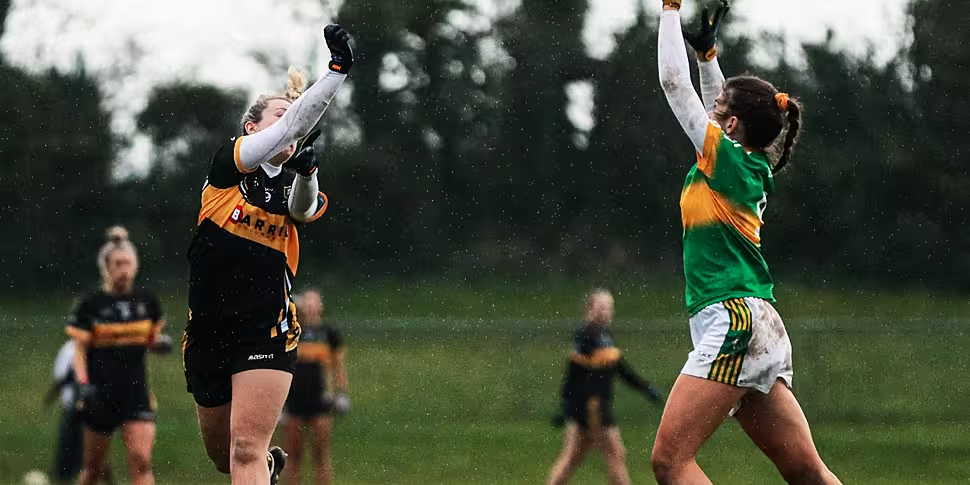A group dedicated to ending discrimination against transgender people has said it is 'really disappointed' at reports trans women could be banned from women's contact rugby in Ireland.
Reports this morning suggest the IRFU is considering following its English counterpart in introducing the ban.
An IRFU spokesperson said the review is being carried out based on emerging information about player welfare.
It comes after the Ladies Gaelic Football Association (LGFA) said it was working on a new transgender policy after there was an objection to a transgender woman playing in a ladies’ football final in Dublin.
On Newstalk Breakfast this morning, Sunday Independent journalist Mark Tighe said Giulia Valentino from Italy was playing for Na Gaeil Aeracha against Na Fianna in the Dublin Junior J Shield football final.
He said Na Fianna objected to Valentino playing in the match and the referee warned Na Gaeil Aeracha - Ireland’s first explicitly LGBTQ+ inclusive club - that the result could be appealed.
Eventually they won the match 7-11 to 1-05, picking up the first piece of silverware in their history.
“This kind of erupted in controversy on Twitter,” he said. “There was a photograph of the semi-final match with Ballyboden St Enda’s with the same player."
“They are a tall person, slightly balding and there was quite a bit of controversy. It was claimed falsely that the player scored 2-9 in the match when they didn’t score at all.”
He said the LGFA currently has no specific policy on transgender players but is now developing one.
"Really disappointed"
Also on the show, Transgender Equality Network Ireland Education Officer Daire Dempsey said the network was “really disappointed” at the ban on transgender people playing women’s contact rugby in the UK.
“We have been following the IRFU as it develops but we would obviously be very disappointed in a blanket ban on trans women in rugby,” they said.
“My understanding is that a blanket ban on trans women in Irish rugby would affect three or maybe five players across the country.
“The impact that ban would have on these players who just want to play and just like rugby - who are valued members of their local clubs - is going to be huge.
“It’s going to have a hugely negative impact on any trans person who wants to play sport, not even necessarily to compete but just want to play sport, and it is not going to have much of an impact on women’s sport overall, again because we are looking at such small numbers of payers.”
Perspective
They said they have been encouraging people to “keep a little bit of perspective” throughout the controversy over the ladies’ football final.
“We are talking 1% of the population, maybe, is trans,” they said.
“Then a smaller percentage obviously would be trans women, then a smaller percentage again would be doing any sport and then, there are even less in any one sport.
“So, we’re not talking about a huge movement of people into women’s sport. We’re not talking about changing the face of women’s sport. Really, we’re talking about a handful of players in any one sport and this whole controversy has erupted because of one person.”
"Mental health"
They said the local sports are about “mental health, physical health, a sense of community and a sense of belonging.”
“I think promoting people and kind of encouraging people, particularly from a very marginalised community, to engage with sport and engage with their local communities is only beneficial,” they said.
Player safety
Asked about potential player safety issues, they said there are “ways of promoting player safety and wellbeing that don’t blanket ban an entire population group”.
“When we talk about trans women, it is really important to remember that there is no one way to be trans,” they said.
“There is no one body-type that trans women have. Just like any other woman, just like any other person, everybody varies in size shape and physicality.
“Not all of that will translate into being really good at whatever your sport is as well.”
Fair play
They said there are “ways of managing who is marking who, who is playing against who so that it is played in a fair and equal way”.
“There are already, even within women’s and men’s sports at the moment, players who are bigger than others, stronger than others, faster than others, whatever it might be,” they said.
“People do vary hugely across sports and again, I would note that we are looking at amateur level sports, club-level sports, so even then you have variations in terms of who has played the sport for longer – all that sorts of stuff.
“We are already as sports people able to manage that and able to ensure that people are being treated fairly and kept safe at the same time.”
You can listen back here:
Main image shows action from the Munster Ladies Gaelic Football Association club championship final, 12-12-2021. Image: David Ribeiro/Alamy Live News.









